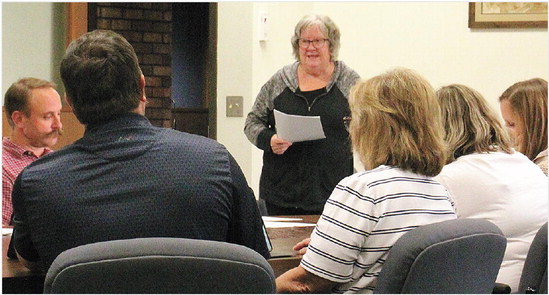Edgar K-12 discusses cell phone restrictions


By Kevin O’Brien
Concerned about the impact of students misusing cell phones in class, Edgar School Board members last week discussed the possibility of restricting their use in the future.
At the end of the board’s monthly meeting on July 16, board member Alison Reinders said she’s concerned about some teachers being too lax about smartphones in their rooms after hearing about students watching online videos or even making their own videos during class.
“To me, that’s very concerning,” she said. “If there’s something we can do to stop that, we should do it.”
Board member Rebecca Normington said if the school board does enact a policy, it needs to be enforceable, so staff can actually address the problem. Reinders said “there’s only so much the district can do,” but she worried that smartphone distractions are keeping students from paying attention in class and jeopardizing their academic growth.
Middle/High School principal Mike Wilhelm said the Medford School District was recently awarded a $40,000 grant to purchase what are called Yondr pouches, protective bags that prevent smartphones and other devices from being used once they are put inside. The pouches are magnetically locked as soon as students enter the building at the beginning of the day and are unlocked once they leave.
Reinders said she would expect a backlash from parents if their students were not allowed to access their phones, though board member Morgan Wesolowski said she believes a lot of parents would understand the need for restrictions.
Superintendent Cari Guden said some parents may be concerned about not being able to get a hold of their child during the school day, but she also said they can always call the office if they need to – as was done in the years for cell phones.
Wilhelm said it ultimately falls to the “adult in the room” to make sure kids are not being distracted by their smartphones, but he also pointed out that some teacher incorporate phones and other personal devices into educational activities. Just in case a student doesn’t have a smartphone, he said they can always use their school-issued Chromebook to participate in such projects. Ultimately, he said it’s a matter of consistency.
“All teachers need to be on the same page,” he said.
The topic was not on the agenda, so no action was taken by the board.
Other business
■ To comply with new federal requirements, the board adopted revisions to the district’s Title 9 policies regarding “nondiscrimination on the basis of sex in educational programs or activities.” The changes include new protocols for handling sexual harassment complaints, which take effect as of Aug. 1, 2024, along with adding nondiscrimination protections related to gender identity.
The district’s Title 9 coordinators, Wilhelm and elementary principal Lisa Witt, are in charge of handling all discrimination complaints through a new grievance process. Staff are receiving training on the new guidelines from a law firm that is offering webinars for free.
Board president Corey Mueller questioned whether the board really had “no choice” in adopting the new policies.
“If you choose not to follow this policy, you will lose all federal funding and be open to action by the DOJ (Department of Justice),” Guden said, noting that the district receives about $500,000 in federal funding every year.
■ The board approved the hiring of Amanda Martinez and Jill Inda as part-time food service workers. Guden said a full-time night custodian position, 2 to 11 p.m., is still open.
■ As part of the end-of-the-year food service report, Guden said the number of school breakfasts served was down by almost 12,000 in 2023-2024, but that was likely due to free breakfast being provided the previous school year. The number of school lunches, on the other hand, went up by 2,340.
■ During a conversation about the amount of personal days and comp time used last school year, board members talked about the difficulty in finding substitutes when teachers take time off. Witt said most of the current subs are retired teachers who are willing to cover classes. Guden noted that the state will approve substitute teaching licenses for those with bachelor’s degrees who undergo training.
■ Board members discussed ongoing issues with charging the new district’s electric bus, which was purchased with a grant last school year. Resident Pat Socha, who drives bus for the district, said the bus company is working to figure out the charging problem.
“Otherwise, I drove the bus. It runs great. I like it,” he said. “When you have kids on it, it’s really quiet. You can hear everything they say.”
DONATION - Stephanie Sinz, center, of #SocialSchool4EDU, presented a $10,000 donation to the Edgar School Board on July 16 in appreciation of the Edgar School District being one of the company’s first clients, starting back in 2016. The company provides school media training and management to highlight the district’s successes online. From left to right are board members Rebecca Normington, Alison Rienders, Megan Wesolowski, Sinz, board president Corey Mueller, vice-president Pamela Stahel and superintendent Cari Guden. Guden said the district plans to use the money to start planning for a possible outdoor classroom.
STAFF PHOTO/KEVIN O’BRIEN






